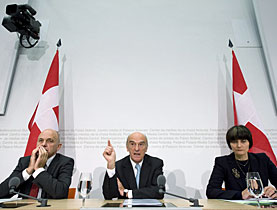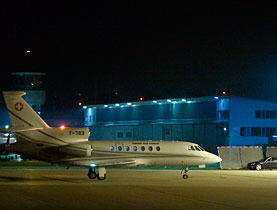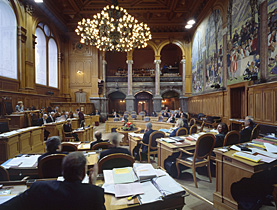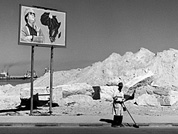Cabinet “disappointed” by Libya’s conduct

The Swiss cabinet has expressed irritation over the "systematic refusal" of Libya to implement agreements between the two countries.
On Wednesday a 60-day deadline for normalising relations ran out with no word on the fate of two Swiss businessmen detained in Libya for over a year.
At a news conference on Thursday, cabinet members declined to say what measures would be taken towards Libya.
“Switzerland sticks to its agreements and promises to all states, and expects Libya to do the same,” President Hans-Rudolf Merz said.
Switzerland had since August 2008 adhered to the principles of a state under the rule of law in its dealings with Tripoli, and would continue to do so, Merz said.
Regarding the arrest of Hannibal Gaddafi – son of the Libyan ruler – in Geneva last July, Merz recalled that Switzerland had conducted an investigation, apologised to Libya and signed a binding agreement to normalise relations.
“In this unclear situation I extended my hand to the Libyans,” he said. No progress had been made since then.
“The cabinet is disappointed that Libya is not sticking to the agreements,” Merz said.
Apportioning blame
“The problem does not lie with Switzerland but with Libya,” argued Foreign Minister Micheline Calmy-Rey, noting that Bern had studied the situation in detail.
The government had charged the foreign ministry with “diplomatic follow-up”, she said, without further clarification.
“Libya is systematically refusing any cooperation and has also taken the two Swiss citizens hostage, violating international laws,” she said.
Under the circumstances, no details of future strategy could be announced, Calmy-Rey said.
She several times referred to the “kidnapping” and “abduction” of the two Swiss businessmen in Libya, expressions not used by the government before in talking about the case.
There was no mention of possible measures against Libya, though there has been some speculation about ways to ban Libyans from entering the entire Schengen bloc of 15 European countries and not just Switzerland.
“We have tried with negotiations for more than a year in good Swiss tradition to build bridges and open doors,” Merz said, adding he felt sympathy for the Swiss men’s family and friends. “We share their pain in this situation.”
Numerous efforts
The comments follow a meeting the cabinet held at an unnamed location outside the Swiss capital, Bern, on Wednesday. Earlier in the week a Swiss delegation visited Libya once again in an effort to smooth ties between Bern and Tripoli. The diplomats came back empty-handed.
The trip, led by the state secretary at the Swiss foreign ministry, Michael Ambühl, took place just a few days before the deadline elapsed. The dates had been set in an accord signed by the two countries on August 20, when Merz visited Libya and apologised for the arrest of Hannibal Gaddafi in July 2008.
Hannibal Gaddafi and his wife were accused of mistreating their domestic staff at a luxury hotel in the Swiss city. The charges were eventually dropped, but the countries have been at odds ever since. Libya removed billions from Swiss bank accounts, cut flights and revoked exit visas for two Swiss nationals.
Libyan authorities later persuaded one of the men to leave the Swiss embassy in Tripoli, where he had been staying. Both were then whisked off to an undisclosed location.
One of the men’s wives told Swiss television on Wednesday evening that she had not heard from her husband in a month.
In an interview published on Saturday, Foreign Minister Micheline Calmy-Rey said attempts at third-party mediation had failed.
swissinfo.ch and agencies
In a previous diplomatic spat in 1997 Tripoli banned Swiss citizens from entering Libya to protest against Switzerland’s refusal to grant a student visa to a son of Gaddafi.
In return the Swiss authorities tightened entry regulations for Libyan citizens. The conflict was solved in April 1998.
Political contacts between the two countries returned to normal after the UN-imposed sanctions were lifted in 2003.
Libya is one of Switzerland’s five key export markets on the African continent and was its main supplier of crude oil before economic relations were interrupted.
Libya provided about 50% of Swiss crude oil imports and had assets of SFr6.5 billion in Swiss banks in 2007.
Swiss exports in 2007, mainly in the watchmaking and machinery as well as the pharmaceutical industries, rose 16.3% to SFr278.6 million.

In compliance with the JTI standards
More: SWI swissinfo.ch certified by the Journalism Trust Initiative





You can find an overview of ongoing debates with our journalists here. Please join us!
If you want to start a conversation about a topic raised in this article or want to report factual errors, email us at english@swissinfo.ch.